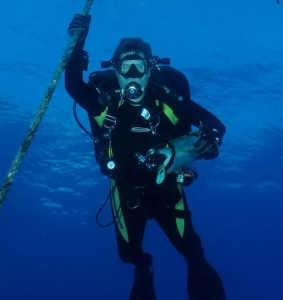Christopher First can’t imagine his life without cave diving.
An Oral Surgeon based in Long Island, New York, Dr. First lives for the beautiful rock formations, stillness of the water, and the adrenaline rush that cave diving affords. But tests late last year showed that Dr. First had a hole in his heart, medically known as a patent foramen ovale (PFO). He was suffering decompression sickness when he dived and was warned against continuing his underwater passion until the hole was closed.

Dr. First, however, didn’t want just any surgeon to perform this procedure, which is considered elective. Two physicians were referred. Lakeland Interventional Cardiologist Douglas G. Ebersole, MD, FACC, was one of the names he received. Dr. Ebersole talked on the phone with Dr. First for over an hour.
“The time he spent and the care he showed are rare occurrences in medicine these days,” said Dr. First, who is 42 years old. “We emailed, talked on the phone. He had no obligation. I was still in the research phase. He was the nicest person – to someone who might never have become his patient.”
And to boot, Dr. Ebersole was a fellow cave diver with extensive expertise in diving medicine, lecturing around the world about diving disorders and diving fitness. He serves as a cardiology consultant for the Divers Alert Network and is a principal investigator for a research trial sponsored by Divers Alert Network on divers with PFO.
The foramen ovale is a channel in the wall between the top two heart chambers that allows oxygenated blood to mix in a fetus prior to birth. After a baby is born, the foramen ovale typically closes. In about 20% to 30% of people, a hole remains. Blood thinners can sometimes help prevent a clot from forming in that opening. When advised, a PFO closure can be repaired through a minimally invasive procedure recently approved by the U.S. Food and Drug Administration. Using a catheter inserted into the inner thigh area, a closure device can be permanently implanted to close the hole. Minimally invasive procedures, such as this catheter-assisted repair, reduce scarring and allow for quicker recoveries for patients.
Dr. First hopped on a flight to Florida for a consultation with Dr. Ebersole.
“I could tell by his time and his professionalism that he was the right guy,” said Dr. First, whose procedure required an overnight stay at Lakeland Regional Health Medical Center and one additional night in a nearby hotel. “Dr. Ebersole texted me to follow up after the procedure. He genuinely cares about his patients.”
Lakeland Regional Health’s Heart Center team also made a strong impression on Dr. First. “You’re stressed and dreading being operated on, and the nurses warmly greet you in the morning,” Dr. First said. “The Catheterization Lab team also was great. They made you feel as relaxed as you possibly could be going into a heart procedure.”
Lakeland Regional Health Medical Center offers Polk County’s only Hybrid Catheterization Lab. This revolutionary one-stop concept allows patients to undergo leading-edge procedures in a room integrated with the latest imaging devices. The Hybrid Catheterization Lab, which opened in 2012, enables both surgical and intravascular procedures to occur sequentially or simultaneously, without moving the patient from one procedure room to another.
